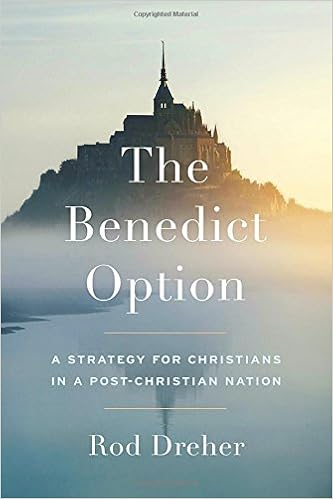In November 2004, I sat in a movie theater and witnessed one of the most chilling, frightening films I had ever seen: The Incredibles.
“Aw, c’mon, Dan,” you might protest. “That was an animated film for kids. Pixar. Now Disney. How can that possibly be anything but rainbows and unicorns?”
This scene:
The film’s writer and director Brad Bird nailed it:
“And when everyone’s super, no one will be.”
For a while, that narrative played in real life. It was a story the forces that hate God and hate His Church attempted to promote. “If everyone is a good person, and we construct a story we tell that makes everyone good, then no one will be morally or ideologically superior to anyone else. And then we can do whatever we want because we will have killed off religion, especially those that draw distinctions between good and evil.”
It’s an insidious ploy. Problem is, it didn’t work. The reason? Human sin.
You can’t claim that everyone is good if people keep doing heinous things. This especially doesn’t work when certain groups of highly visible people repeatedly are behind those atrocities. The goodness lie can’t stand in a world of fallen people.
Here’s where the flip-side is beginning to creep in…
I’ve noticed a new narrative lately coming from those who are desperate to draw moral and ideological equivalencies so as to excuse themselves, while also taking down any exceptionalism claims by any belief system. It’s a concession that the “everyone is super” narrative failed. What we are now being propagandized with is its opposite.
When Alexander Bissonnette walked into a Quebec mosque and unloaded his weapons into the bodies of the men present, the headline the next day described him with a phrase I’d not seen before in the press: Christian terrorist.
This past week, when Cedric Anderson walked into a California school and started shooting, the press wanted to know why Christians were not denouncing this terror perpetrated by a Christian pastor that left people, including a mentally-challanged child, dead.
Anyone else see what is happening here?
There’s a lie building. And from the perspective of those who tried with the goodness message and failed, it’s a more effective foundation supporting this revised agenda, because fallen people tend not to act good. Therefore, instead of finding cases of wholesale good in any group, find instances of the opposite.
“If we want to establish moral and ideological equivalency, we must show that no one is exceptional. Because if no one is exceptional, then there is nothing exceptional about what anyone believes.”
The implementation as an attack on Christian faith is to find deranged, unstable, violent people who have some slim connection to something someone thinks is Christianity, and paint them as brightly as possible as stellar, A-#1 examples of Christian faith. Then say, “Look at this mass murderer Christian! Christians are just as bad as everyone else. In fact, they may be the real monsters we never realized lived among us.”
You see, Alexandre Bissonnette liked Pope John Paul II on his Facebook page and used an image of a crusader to announce his savage plan to murder.
You see, Cedric Anderson called himself a pastor in public and quoted biblical-sounding things on his Facebook page.
So, of course, these murderers and terrorists are shining examples of orthodox Christians. Orthodox Christians are terrorists too. Look! Look!
Except it’s a desperate lie.
Any 15-minute investigation into Bissonnette showed, if anything, that he is beholden more to an atheistic humanism with roots in rationalist philosophy than to anything Christian. The label doesn’t stick. At all.
Same for Anderson. A con man with a history of weapons and violence charges, who appears to have lied about his military service, had no church behind his “pastorate,” and who espouses some mangling of the Old Testament in a series of Facebook posts—he’s no more an orthodox Christian than Jim Jones.
Thing is, no one tried to draw an equivalency with Jim Jones back in the ’70s. No one looked at the People’s Temple and said, “I can’t see any difference between them and your typical Methodist or Presbyterian church.” Any reporter who tried would have been run out of town on a rail for being so blind and willfully ignorant.
But today? Well, that willful ignorance falls into the rotten “gift” the Web and social media have given us: That if someone says something loudly and often enough on the Internet, that person can find an audience and replace ultimate truth with alternate facts.
Fake news indeed.
This is a real problem for Christian believers.
For us, I don’t see any recourse but to engage this agenda of delegitimizing the Gospel and Christian theology through wide-brushing Christians as morally and ideologically equivalent to those groups that are committing atrocities around the globe. We must confront this forced equivalency and reveal it as the lie that it is. We must draw distinctions between genuine Christian faith and all the perverted forms that people desperate to undermine Christianity are trying to foist on the ignorant as the norm.
Here is one reality we must keep reinforcing. Unlike some other groups out there, terrorists and ideological deviants do not come out of orthodox (small-“o”) Christian churches. Those radicals that may identify (and be identified by outsiders) as “Christian” almost always come out of “churches” with deviant theology that in no way resembles orthodox Christian theology and practice. The distinctions are clear, and anyone should be able to see them if they spend even a little bit of effort to note the difference.
Except those with the equivalency agenda do not want people to do the checking. They figure if they “equivalent-ize” loudly and long enough, people will believe them. Sadly, that seems to work when left uncountered.
All I can say to fellow believers is that we cannot rest and ignore this. If we see someone on the Internet trying to force a moral and ideological equivalency between faiths or belief groups by appealing to examples of “Christians” who commit atrocities, we must speak truth to it.
Again, the most egregious lie is to look for “radicals” and to place them as coming from orthodox church congregations. However, “Radicalized Christians” always come from a “church” with deviant, unorthodox theology, belief, and practice, and almost always glaringly so.
Remember, that to work, this lie must force equivalencies, so it must also operate in the other direction, by excusing non-Christian groups that produce radicals. Fact is, these radicals ARE coming from orthodox versions of that non-Christian group. This is used against Christians by forcing the equivalency that if orthodox examples of these non-Christian groups are producing radicals and terrorists, then orthodox churches are too.
Except this simply is not the case. Radicals do not radicalize in Christian churches that are not preaching radically deviant beliefs.
We orthodox Christians must speak and stop letting outsiders who claim they understand us propagandize lies about us.


 Ever hear the one about things happening in threes?
Ever hear the one about things happening in threes?